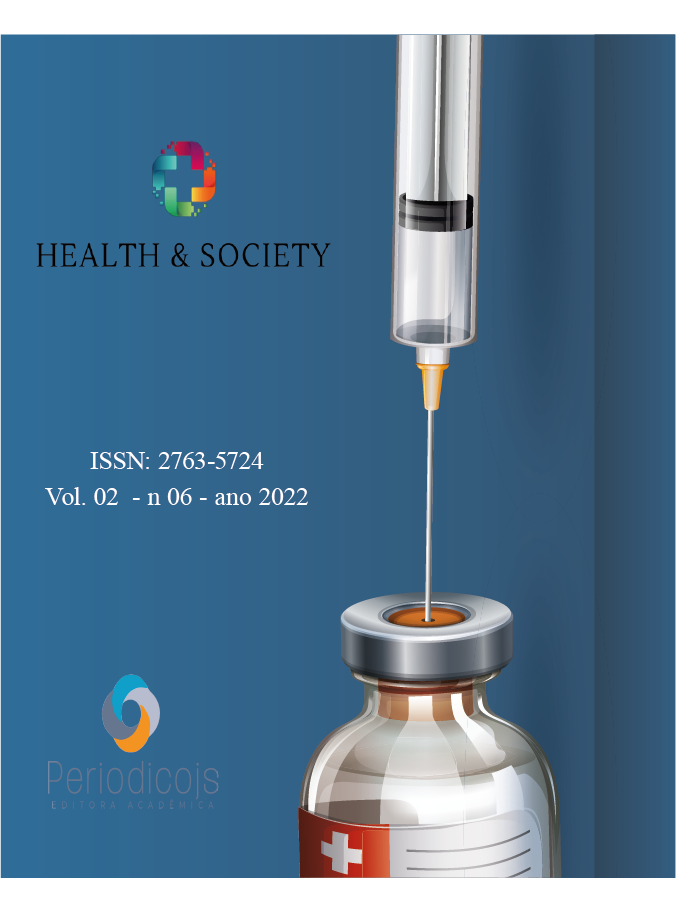Abstract
Introduction: in March 2020, the World Health Organization declared Covid-19 a pandemic, due to its rapid spread. As the virus behaves in different ways and in some cases it can be fatal, many changes have occurred, including those related to biosecurity in hospitals and dental clinics. Aim: to evaluate the changes in biosafety protocols and the anxiety rates of undergraduate dentistry students. Methods: 100 academics who were enrolled in at least one discipline with clinical care for patients and which has a biosafety protocol were invited to participate in the research. The questions addressed were related to personal data (age, gender) and an adapted questionnaire on “Biosecurity in times of Covid” and a questionnaire on “Fear and Anxiety in the face of the coronavirus pandemic”. Results: A total of 100 academics from the University Center of Serra Gaúcha (FSG) participated in the research. Of these, 20 (20%) were male and 80 (80%) were female. The average age of participants was 22.8 years. Of these 100 students, 13 were in the 4th semester of the course, 39 were in the 6th semester, 23 were in the 8th and 25 in the 10th semester of the course. When asked if they felt fear when hearing that people were dying from COVID-19, 66% of academics said they felt fear. Regarding the fear of taking the infection from the clinic to the family, 91% of students said they were afraid. Next, students were asked if they were afraid of talking to patients in closed environments, only 12% said they were afraid. Sixty percent (60%) of students say they feel anxious when providing care to patients who have a cough or are suspected to be infected with the COVID-19 virus. Conclusion: negative effects on students’ mental health, such as fear and anxiety due to the risk of contamination and transmission of the COVID-19 virus, have been caused, requiring the implementation of mental health promotion strategies, especially if the pandemic extends.
References
CAVALVANTE, A. S. P et al. Educação superior em saúde: a educação a distância em meio à crise do novo coronavírus no Brasil. Av Enferm. 2020; 38(1supl):52-60. DOI: https://doi.org/10.15446/av.enferm.v38n1supl.86229.
CNS - Conselho Nacional de Saúde. Resoluções. Disponível em: <https://conselho.saude.gov.br/resolucoes/reso_98.htm >. Consultado em: 23.03.2022
DE ALMEIDA, R.Z et al. Medo e ansiedade de estudantes de Odontologia diante da pandemia do novo coronavírus: um estudo transversal : Medo e ansiedade frente ao COVID-19. Archives of Health Investigation, v. 9, n. 6, p. 623–628, 2020.
DOS SANTOS, J.C.F; CEZAR, N. J. B. Percepção dos conceitos de biossegurança em estudantes da área de saúde de uma instituição de ensino superior do Agreste – PE Braz. J. of Develop., Curitiba, v. 6, n. 6, p.37636-37650, jun. 2020.
FRANCO, J.B et al. Cuidados Odontológicos na era do COVID-19: recomendações para procedimentos odontológicos e profissionais. Revista Assoc Paul Cir Dent, v. 74 n. 1, p.18-21, 2020.
JUNIOR, E.R et al. Conflito entre economia e saúde? O caso da COVID-19 no Brasil. RGO - Revista Gestão Organizacional, Chapecó, v. 14, n. 1, p. 378-389, jan./abr. 2021.
LIMA, K.E.R et al. Medo e ansiedade de estudantes de odontologia durante a segunda onda da pandemia de COVID-19. Research, Society and Development, v. 10, n. 8, e26010817171, 2021.
LOPES, A.L et al. Biossegurança em Odontologia: conduta dos estudantes antes e após uma ação educativa. Revista da ABENO, v.19, n2, p43-53, 2019.
MACHADO, G.M et al. Biossegurança e retorno as atividades em odontologia: aspectos relevantes para o enfrentamento de COVID-19. Stomatos, v. 26, n50, p. 30-45, Jan./Jun. 2020.
MEC - Ministério da Educação do Brasil. Portaria 1.428, de 28 de dezembro de 2018. Dispõe sobre a oferta, por Instituições de Educação Superior - IES, de disciplinas na modalidade a distância em cursos de graduação presencial. Brasília-DF; 2018. https://bit.ly/3ceRYMO. Consultado em: 23.03.2022
MEDEIROS, F.L.S et al. Impactos da pandemia da COVID 19 na educação odontológica: Visão de graduandos de Odontologia de uma instituição pública no Estado da Paraíba. Research, Society and Development, v. 10, n. 7, e15310716089, 2021.
MENG, L et al. Coronavirus Disease 2019 (COVID-19): Emerging and Future Challenges for Dental and Oral Medicine. J Dent Res, v. 99, n.5, p.481-487, May 2020.
NASCIMENTO, A.R.F et al. Saliva, implicações orais e biossegurança em Odontologia - principais aspectos do COVID-19. Arq Odontol, Belo Horizonte, v. 57, p.114-121, e12, 2021.
NERIS, L.N.F et al. Contaminação Cruzada em uma Clínica Escola de Odontologia: Riscos e Condutas Durante Pandemia COVID-19. JNT- Facit Business and Technology Journal. Ed. 31, v. 2, p.795-821. Outubro-Novembro de 2021.
PENNA, P.M.M et al. Biossegurança: uma revisão. Arq. Inst. Biol., São Paulo, v.77, n.3, p.555-465, jul./set., 2010.
PRADO, A.D et al. A saúde mental dos profissionais de saúde frente à pandemia do COVID-19: uma revisão integrativa. Revista Eletrônica Acervo Saúde, n.46, p.4128, 26 jun. 2020.
SAHU, P. Closure of Universities Due to Coronavirus Disease 2019 (COVID-19): Impact on Education and Mental Health of Students and Academic Staff. Cureus, v.12, n.4, p.7541, 4 abril. 2020.
SILVA, K.R.T et al. Percepção das auxiliares e técnicas em saúde bucal do município de Três Lagoas/MS sobre biossegurança: reconsiderações em tempos de Covid-19. Brazilian Journal of Health Review, Curitiba, v.4, n.5, p. 19023-19038 sep./oct. 2021.
TUÑAS, I.T.C et al. Doença pelo Coronavírus 2019 (COVID-19): Uma Abordagem Preventiva para Odontologia. Revista Brasileira de Odontologia, n. 77, p.1766, 2020.
VEENA, H.R et al. Dissemination of aerossol and splatter during ultrasonic scaling:a pilot study. Journal of Infection and Public Health, n.8, p.260-64, 2015.
XEREZ, J.E et al. Perfil de Acadêmicos de Odontologia sobre Biossegurança. Rev. Fac. Odontol. Porto Alegre, v. 53, n. 1, p. 11-15, jan./abr., 2012.
World Health Organization. Coronavírus (Covid-19): Painel de emergência de saúde da WHO. WHO, 2020. https://covid19.who.int/. Consultado em: 23.03.2022

This work is licensed under a Creative Commons Attribution 4.0 International License.
Copyright (c) 2023 Nicoli Gonçalves da Silva, Juliane Pereira Butze





